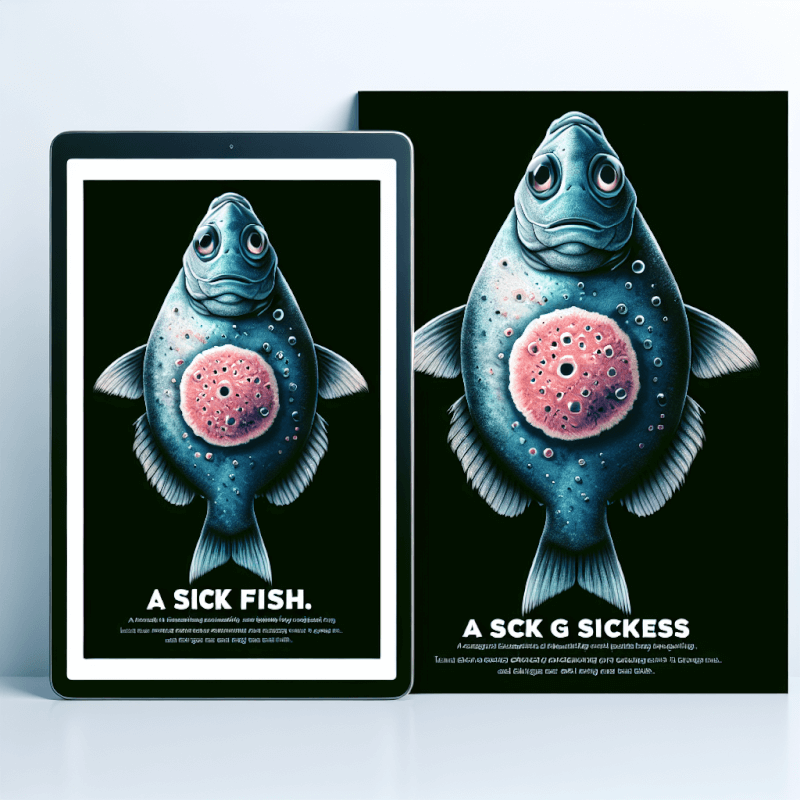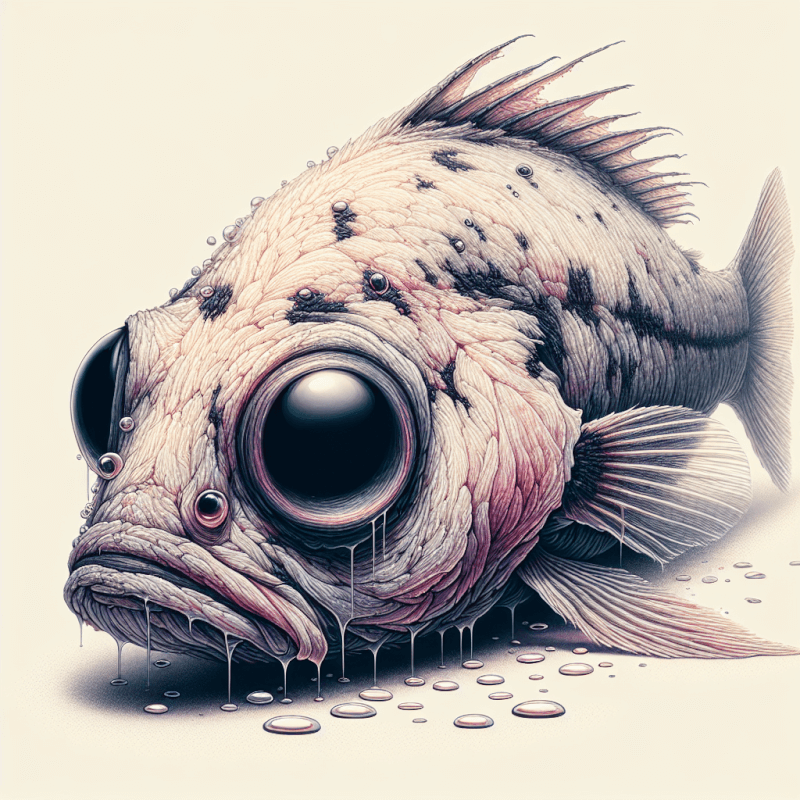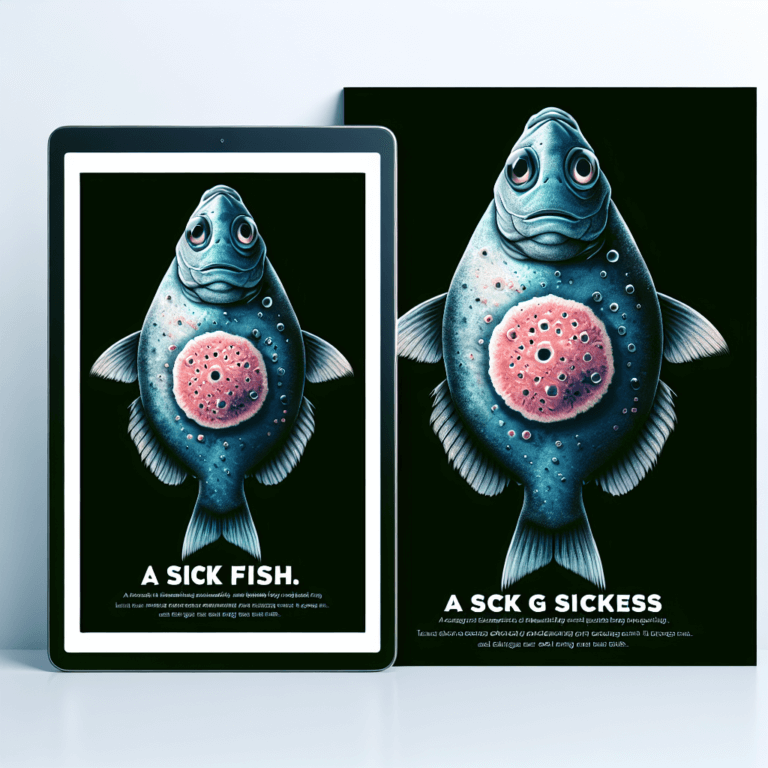If you’re wondering what to do when your fish falls ill, this article will guide you through the necessary steps to help your finned friend recover. We’ll explore common signs of fish illness, provide tips on how to assess your aquarium’s conditions, and offer advice on potential treatments. Whether you’re a seasoned fish owner or a newbie, this article will equip you with the knowledge and resources to ensure the well-being of your aquatic companion.
Identifying Fish Health Issues
When you notice that your fish is behaving differently or showing signs of illness, it is important to quickly identify the potential health issues. There are several key aspects to consider when assessing the well-being of your fish: observing their behavior, examining their physical appearance, and checking the water conditions in their tank.
Ready for Cat Trivia?
Test your knowledge about cats!

Observing Fish Behavior
Fish communicate through their behavior, so paying close attention to any changes can provide valuable insights into their health. Look out for abnormal swimming patterns, such as darting or floating near the water’s surface. If your fish are suddenly exhibiting lethargy, loss of appetite, or excessive hiding, it may indicate an underlying health issue. Additionally, aggressive behavior or unusual interactions between fish can suggest stress or territorial disputes.
Examining Physical Appearance
The physical appearance of your fish can tell you a lot about their health. Keep an eye out for any visible abnormalities, such as wounds, sores, protruding scales, or bloating. Changes in coloration, including spots, blotches, or fungal growth, should not be ignored. Another important aspect to consider is the condition of their fins and gills. Damaged or shredded fins, as well as inflamed or discolored gills, may indicate a health problem.
Checking Water Conditions
Maintaining proper water conditions is crucial for the overall health of your fish. Test the water regularly for parameters such as temperature, pH level, ammonia, nitrite, and nitrate levels. Any imbalances or fluctuations in these factors can stress your fish and make them more susceptible to diseases. Additionally, poor water quality can lead to the growth of harmful bacteria, parasites, and fungi. Ensuring pristine water conditions is essential in preventing and addressing fish health issues.
Immediate Actions
When you identify that a fish in your tank is sick, taking immediate action is crucial to prevent the spread of the disease and improve their chances of recovery. There are several essential steps you should take when faced with a sick fish:
Remove Sick Fish from the Main Tank
As soon as you notice a fish exhibiting symptoms of illness, it is vital to isolate them from the rest of the tank inhabitants. This will prevent the potential transmission of diseases and reduce stress on the sick fish. Use a clean net to gently catch the affected fish and transfer them to a separate quarantine tank.
Quarantine the Fish
Setting up a quarantine tank allows you to closely monitor and treat the sick fish without putting other healthy fish at risk. Ensure that the quarantine tank is adequately equipped with appropriate filtration and maintain stable water conditions. Keep the temperature and pH in line with the sick fish’s requirements and provide hiding places for their comfort.
Adjust Water Temperature and pH
Certain diseases respond positively to specific water temperature and pH levels, while others may require adjustments to halt their progression. Research the optimal temperature and pH range for the specific disease affecting your fish, and make the necessary adjustments within the quarantine tank. However, be cautious not to make dramatic changes that could further stress the fish. Seek advice from a veterinarian or aquatic specialist if you are unsure about the appropriate adjustments.

Common Fish Diseases
There are several common diseases that fish owners frequently encounter. Becoming familiar with these conditions will assist you in promptly recognizing and effectively treating them.
Ich (White Spot Disease)
Ich, or white spot disease, is a highly contagious parasitic infection that affects many freshwater and saltwater fish species. It is characterized by the appearance of white spots resembling grains of salt on the fish’s skin and fins. Additionally, infected fish may exhibit flashing behavior and increased respiratory rate. Treating ich typically involves increasing the tank temperature and using medicated treatments specifically formulated to eliminate the parasite.
Fin Rot
Fin rot is a bacterial infection that primarily affects the fins and can rapidly spread throughout the fish’s body if left untreated. Infected fish may display shredded, frayed, or disintegrating fins. The underlying cause of fin rot is often poor water conditions or stress. To treat fin rot, it is crucial to improve water quality, and if necessary, administer antibacterial medications to combat the infection.
Columnaris
Columnaris, or cotton wool disease, is a bacterial infection that commonly affects freshwater fish. It manifests as fuzzy, cotton-like growth on the fish’s skin, fins, and mouth. Additionally, infected fish may exhibit lethargy, loss of appetite, and clamped fins. Treating columnaris involves administering broad-spectrum antibiotics and improving water quality. This disease can be highly contagious, so quick action is essential to prevent its spread.
Treating Bacterial Infections
Bacterial infections in fish can cause severe health complications if not treated promptly and appropriately. There are various treatment options available to effectively combat these infections.
Using Antibiotics
When dealing with bacterial infections, antibiotics specifically formulated for aquatic use are often necessary. These medications can be administered through the water, where they are absorbed by the fish, or directly into their food. It is crucial to follow the prescribed dosage and treatment duration to ensure successful eradication of the bacteria. Be sure to research the specific bacterial infection affecting your fish and select the appropriate antibiotic accordingly.
Applying Medications in Food
Some fish may be reluctant to consume medicated food directly. In such cases, you can mix the prescribed medication with a small amount of palatable food, such as frozen or live daphnia or bloodworms. Ensure that the fish finishes the entire portion to receive the full dosage. If needed, isolate the affected fish in a separate container during feeding to prevent other fish from consuming the medicated food.
Treating with Salt
Salt is a common remedy for certain bacterial infections in fish. Adding aquarium salt (non-iodized salt) to the quarantine tank can help create a more hostile environment for bacteria, thus aiding in the healing process. Follow the recommended dosage depending on the severity of the infection and closely monitor the fish’s reaction. It is important to note that not all bacterial infections respond well to salt treatment, so thorough research and accurate diagnosis are crucial.

Dealing with Parasitic Infections
Parasitic infections can be particularly challenging to manage in fish tanks, as they can reproduce rapidly and have complex life cycles. When faced with a parasitic infection, prompt action is necessary to prevent the parasites from causing further harm to the affected fish and spreading to other tank inhabitants.
Implementing Medications
There are a variety of commercially available medications designed to treat various parasites in fish. These medications typically come in liquid or powder form and can be added directly to the fish tank. Follow the instructions provided by the manufacturer, including the recommended dosage and treatment duration. It is important to note that some medications may harm beneficial bacteria, so monitor water parameters closely during treatment.
Salt Baths
Salt baths are an effective and natural way of treating certain parasitic infections in fish. By conducting a separate bath with a specific concentration of aquarium salt, you create an environment that is unfavorable to parasites while ensuring the well-being of the fish. Carefully follow the recommended salt concentration and duration for the specific parasite you are targeting. After the bath, thoroughly acclimate the fish back to their quarantine tank.
Hydrogen Peroxide Baths
In some cases, a hydrogen peroxide bath can be utilized to treat external parasites on fish. This method involves carefully diluting hydrogen peroxide in water and immersing the fish in the solution for a short duration. The diluted hydrogen peroxide effectively kills external parasites while minimizing harm to the fish when used correctly. Consult with a veterinarian or aquatic specialist for precise instructions on administering hydrogen peroxide baths.
Fungal Infections
Fungal infections can occur in fish with weakened immune systems or as a result of poor water quality. Prompt treatment is necessary to prevent the infection from spreading and causing further harm to the fish. Various treatment options are available to combat fungal infections effectively.
Applying Antifungal Medications
Antifungal medications designed for fish are a reliable treatment method for fungal infections. These medications typically come in liquid or powder form and can be administered directly into the fish tank or applied topically on affected areas. Follow the recommended dosage and treatment duration to effectively eliminate the fungus. Remove any organic matter from the tank to prevent recontamination.
Salt Baths
Similar to treating parasitic infections, salt baths can also aid in the recovery of fish suffering from fungal infections. The salt concentration should be specific to fungal treatments and closely adhered to. Conduct the salt baths in a separate container, carefully monitor the fish during the process, and acclimate them back to their quarantine tank afterward.
Improving Water Quality
Fungal infections are often a result of poor water quality or stress. To prevent recurrent fungal infections and assist in the treatment process, focus on improving the water conditions within your quarantine tank. Monitor and maintain optimal temperature, pH level, and water parameters. Regular water changes, adequate filtration, and removal of any decaying matter will help create a healthy environment conducive to the fish’s recovery.

Providing Proper Nutrition
Proper nutrition plays a vital role in maintaining fish health and preventing diseases. Offering a balanced and varied diet will enhance your fish’s immune system, ensuring their overall well-being. Consider the following factors when providing nutrition to your fish.
Choosing Nutritious Fish Food
Selecting high-quality fish food formulated for the specific species you have is essential. Look for food that contains a balanced mix of proteins, carbohydrates, fats, vitamins, and minerals. Consider the dietary preferences and needs of your fish, such as herbivorous, omnivorous, or carnivorous diets. Additionally, choose food that is suitable for their size, as smaller fish may require finely ground pellets or flakes.
Feeding Frequency and Quantity
Establishing a consistent feeding schedule is crucial to meet your fish’s nutritional requirements without overfeeding. Fish should generally be fed small portions two to three times a day, ensuring they consume the food within a few minutes. Overfeeding can lead to excess waste, poor water conditions, and obesity. However, different species may have unique feeding requirements, so research their specific dietary needs to provide optimal care.
Supplementing with Fresh Foods
To provide additional nutrients and variety, consider supplementing your fish’s diet with fresh foods. Offer small portions of chopped or blanched vegetables, such as peas or lettuce, suitable for herbivorous species. Frozen and live foods, such as brine shrimp, bloodworms, or daphnia, can be provided to mimic their natural diet. Always ensure that any fresh or live foods are of appropriate size and properly cleaned to avoid introducing harmful pathogens to the tank.
Maintaining Good Water Quality
Proper water quality is paramount to the health and well-being of your fish. Consistently monitoring and maintaining optimal water conditions will help prevent the occurrence of diseases and ensure the vitality of your aquatic pets.
Monitoring Water Parameters
Regularly test the water parameters in your fish tank to ensure they fall within the appropriate range for your specific fish species. Use test kits to measure parameters such as temperature, pH level, ammonia, nitrite, and nitrate levels. Inconsistent or poor water conditions can stress fish and make them more susceptible to diseases. By regularly monitoring these parameters, you can quickly identify any imbalances or potential issues and take appropriate corrective measures.
Performing Regular Water Changes
Performing regular water changes is vital in maintaining a clean and healthy aquatic environment for your fish. Partial water changes should be conducted weekly, removing around 20-30% of the tank’s volume. Replace the removed water with dechlorinated water of the same temperature to minimize stress on the fish. Regular water changes help remove accumulated toxins, excess nutrients, and waste, promoting better overall water quality.
Using Filtration Systems
A reliable filtration system is essential in maintaining good water quality in your fish tank. The filtration system will remove debris, excess food, and fish waste, preventing the accumulation of harmful substances and promoting a healthy environment. Regularly clean and maintain the filtration system according to the manufacturer’s instructions to ensure optimal performance. The specific type of filtration system you require will depend on your tank size and the needs of your fish.

Preventing Fish Diseases
Prevention is always better than cure when it comes to fish diseases. By implementing proactive measures, you can significantly reduce the risk of your fish falling ill.
Quarantining New Fish
Before introducing new fish into your main tank, it is essential to quarantine them. New fish may carry diseases that are not immediately visible, which can infect the existing tank inhabitants. Isolate new arrivals in a separate quarantine tank for a minimum of two weeks, closely monitoring their behavior and health during that period. Observe for any signs of illness or abnormalities before integrating them into the main tank.
Avoiding Overcrowding
Maintaining proper stocking levels in your fish tank is critical to preventing stress and disease outbreaks. Overcrowding can lead to competition for resources, increased waste production, and the spread of pathogens. Research the specific space requirements for each species you plan to keep and adhere to those guidelines. Consider the adult size and behavior of the fish when determining appropriate tank mates. By avoiding overstocking, you provide a healthier and less stressful environment for your fish.
Maintaining a Clean Tank
Regular tank maintenance is crucial for preventing the buildup of harmful substances and the growth of bacteria, parasites, and fungi. Clean the tank regularly, removing excess food, waste, and debris from the substrate. Avoid using cleaning agents or chemicals that can harm your fish. Scrub the aquarium glass, decor, and filtration equipment to remove any accumulation of algae or biofilm. A clean tank promotes the overall well-being and health of your fish.
Consulting a Veterinarian
In some instances, despite your best efforts, fish may still fall seriously ill or exhibit symptoms that you are uncertain how to address. Consulting a veterinarian who specializes in fish health can provide expert guidance and treatment options.
When to Seek Professional Help
If your fish’s condition deteriorates, or you are unable to identify the specific disease or course of treatment, it is advisable to seek professional help from a fish veterinarian. Additionally, if multiple fish in the tank are affected, or the disease shows resistance to treatment, a veterinarian’s expertise will be invaluable. Prompt intervention from a professional can greatly improve the chances of a successful recovery for your fish.
Choosing a Fish Veterinarian
When selecting a fish veterinarian, it is essential to choose someone with experience and expertise in aquatic animal health. Look for veterinarians who specialize in fish or have a background in aquatic medicine. Seek recommendations from local fish enthusiasts or aquatic societies, and inquire about the veterinarian’s training, credentials, and familiarity with various fish species. A knowledgeable and compassionate veterinarian will offer valuable advice and personalized treatment plans for your sick fish.
Providing Accurate Information
When consulting a fish veterinarian, it is crucial to provide accurate and detailed information about the fish’s symptoms, behavior changes, and any treatments already administered. Document any observations and changes you have noticed, including dates and descriptions. Share the information about your tank setup, including filter type, water parameters, and any recent changes to the environment. Accurate information will assist the veterinarian in making an accurate diagnosis and formulating an appropriate treatment plan for your fish’s specific needs.
Taking care of sick fish requires attentiveness, prompt action, and a comprehensive approach to treating the underlying health issues. By identifying fish health problems, applying immediate actions, and following effective treatment methods, you can provide the best possible care for your aquatic companions. Remember, prevention is key, so maintaining good water quality, providing proper nutrition, and practicing disease prevention measures are essential for minimizing the risk of fish diseases. If in doubt or facing persistent health problems, do not hesitate to consult a fish veterinarian for professional guidance. With your dedicated care, your fish will have the best chance of recovering and thriving in their aquatic home.



